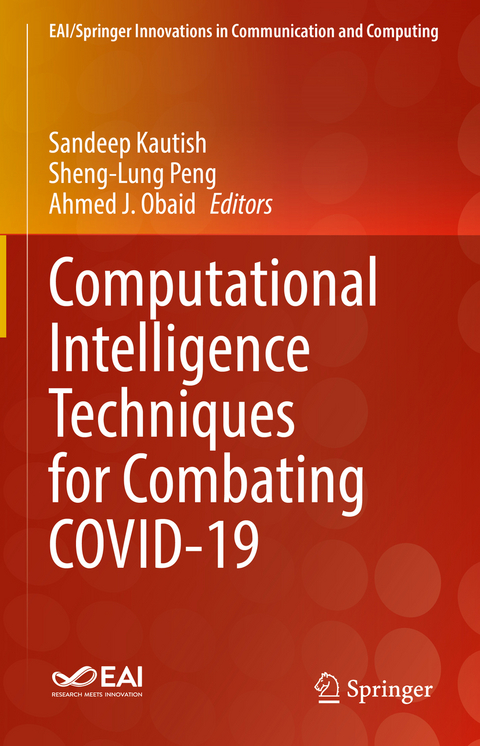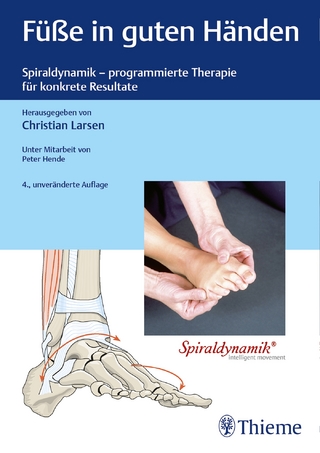
Computational Intelligence Techniques for Combating COVID-19
Springer International Publishing (Verlag)
978-3-030-68935-3 (ISBN)
This book presents the latest cutting edge research, theoretical methods, and novel applications in the field of computational intelligence and computational biological approaches that are aiming to combat COVID-19. The book gives the technological key drivers behind using AI to find drugs that target the virus, shedding light on the structure of COVID-19, detecting the outbreak and spread of new diseases, spotting signs of a COVID-19 infection in medical images, monitoring how the virus and lockdown is affecting mental health, and forecasting how COVID-19 cases and deaths will spread across cities and why. Further, the book helps readers understand computational intelligence techniques combating COVID-19 in a simple and systematic way.
lt;p>Dr. Sandeep Kautish is working as Professor & Dean-Academics with LBEF Campus, Kathmandu Nepal running in academic collaboration with Asia Pacific University of Technology & Innovation Malaysia. He is an academician by choice and backed with 16+ Years of work experience in academics including over 05 years in academic administration in various institutions of India and abroad. He has meritorious academic records throughout his academic career. He earned his bachelors, masters and doctorate degree in Computer Science on Intelligent Systems in Social Networks. He holds PG Diploma in Management also. His areas of research interest are Business Analytics, Machine Learning, Data Mining, and Information Systems. He has 40+ publications in his account and his research works has been published in reputed journals with high impact factor and SCI/SCIE/Scopus/WoS indexing. His research papers can be found at Computer Standards & Interfaces (SCI, Elsevier), Journal of Ambient Intelligence and Humanized Computing (SCIE, Springer). Also, he has authored/edited various books with reputed publishers i.e. Springer, Elsevier, De Gruyter, and IGI Global. He has been invited as Keynote Speaker at VIT Vellore in 2019 for an International Virtual Conference. He filed one patent in the field of Solar Energy equipment using Artificial Intelligence in 2019. He is an editorial member/reviewer of various reputed SCI/SCIE journals i.e. Computer Communications (Elsevier), ACM Transactions on Internet Technology, Cluster Computing (Springer), Neural Computing and Applications (Springer), Journal of Intelligent Manufacturing (Springer), Multimedia Tools & Applications (Springer), Computational Intelligence (Wiley), Australasian Journal of Information Systems (AJIS, International Journal of Decision Support System Technology (IGI Global USA), International Journal of Image Mining (Inderscience). He has supervised one PhD in Computer Science as a co-supervisor at Bharathiar University Coimbatore. Presently two doctoral scholars are pursuing their PhD under his supervision in different application areas of Machine Learning. He is a recognized academician as Session Chair/PhD thesis examiner at various international universities of reputes i.e. University of Kufa, University of Babylon, Polytechnic University of the Philippines (PUP), Anna University Chennai, Savitribai Phule Pune University, M.S. University, Tirunelveli, and various other Technical Universities.
Sheng-Lung Peng is a Professor and the director (head) of the Department of Creative Technologies and Product Design, National Taipei University of Business, Taiwan. He received the PhD degree in Computer Science from the National Tsing Hua University, Taiwan. He is an honorary Professor of Beijing Information Science and Technology University, China, and a visiting Professor of Ningxia Institute of Science and Technology, China. He is also an adjunct Professor of Mandsaur University, India. Dr. Peng has edited several special issues at journals, such as Soft Computing, Journal of Internet Technology, Journal of Real-Time Image Processing, International Journal of Knowledge and System Science, MDPI Algorithms, and so on. His research interests are in designing and analyzing algorithms for Bioinformatics, Combinatorics, Data Mining, and Networks areas in which he has published over 100 research papers.
Ahmed J. Obaid, is an creative lecturer at the Department of Computer Science, Faculty of Computer Scinece and Mathematics, University of Kufa, a PhD in Web Mining and Data Mining from University of Bablyon in 2017 and a Postdoctoral Researcher at the University of SIT January 2020, under advanced technologies in Web Mining Techniques and Applications. His main line of research is Web mining Techniques and Application, Image processing in the Web Platforms. Ahmed J. is Editor in
Introduction.- Machine Intelligence Techniques for Identification and Diagnosis of COVID-19.- AI and ML approaches for Drug Discovery and Manufacturing for COVID-19.- Medical Imaging Diagnosis and Analysis for COVID-19.- Personalized Medicines and vaccines development for COVID-19.- Machine Learning and Behavioral Modification for COVID-19.- Smart Health Record Management Techniques for COVID-19.- Intelligent Clinical Trials for COVID-19.- Crowdsourcing and Data Collection for COVID-19.- Radiotherapy for COVID-19.- Outbreak Prediction for COVID-19.- Intelligent Mobile Applications for COVID-19.- Internet of Things enabled applications and design Challenges.- Big Data Enabled Solutions for COVID-19.- Electronic Governance Policies for Pandemic Crisis.- Use of Automation and Robots to Fight Coronavirus.- AR, VR and New-Age Technologies Demand Escalates Amid COVID-19.- Unlocking Potentials of NLP to Fight against COVID-19 Crisis.- Chatbots for Coronavirus.- Conclusion.
"It is a good source for artificial Intelligence (AI) or healthcare students looking for graduate-level project ideas. It is also good reading for researchers in AI applications and healthcare." (Maulik A. Dave, Computing Reviews, January 16, 2023)
“It is a good source for artificial Intelligence (AI) or healthcare students looking for graduate-level project ideas. It is also good reading for researchers in AI applications and healthcare.” (Maulik A. Dave, Computing Reviews, January 16, 2023)
| Erscheinungsdatum | 05.05.2021 |
|---|---|
| Reihe/Serie | EAI/Springer Innovations in Communication and Computing |
| Zusatzinfo | X, 390 p. 154 illus., 129 illus. in color. |
| Verlagsort | Cham |
| Sprache | englisch |
| Maße | 155 x 235 mm |
| Gewicht | 757 g |
| Themenwelt | Mathematik / Informatik ► Informatik |
| Medizin / Pharmazie ► Physiotherapie / Ergotherapie ► Orthopädie | |
| Technik ► Elektrotechnik / Energietechnik | |
| Technik ► Nachrichtentechnik | |
| Schlagworte | CoronaVirus and computational intelligence • CoronaVirus and Machine Intelligence • COVID-19 and computational intelligence • Fuzzy Systems and computational intelligence • Respiratory Distress Syndrome and computational intelligence |
| ISBN-10 | 3-030-68935-2 / 3030689352 |
| ISBN-13 | 978-3-030-68935-3 / 9783030689353 |
| Zustand | Neuware |
| Haben Sie eine Frage zum Produkt? |
aus dem Bereich


